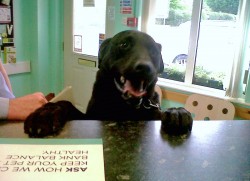
Coping with Fireworks
Many pets become stressed and fearful during firework season.
Signs of FEAR – hiding, cowering, destructive behaviour
Signs of ANXIETY – panting, pacing, restlessness, hypervigilance, inappetance, trembling, and more frequent elimination (toileting)
Early signs to watch for – lip licking, yawning
Preparing for the Event
Dog owners can create a comforting ‘den’ for your dogs and encourage them to use it by hiding healthy food and treats or toys there. The refuge area will provide a ‘safe place’ for your dog to go to during the fireworks. Remember that the animal should want to head here to safety, rather than hide from danger.
Most cats manage their fear of loud noises by voluntarily staying indoors. Make sure that cats can access their favourite ‘den’. Provide a litter tray well ahead of the event and this will help prevent any accidents both before and during the firework season. It is recommended that cats are not picked up or restrained, as fearful cats prefer to be left to cope on their own. In multi-cat households, do be aware that shutting cats in together overnight may cause disharmony amongst them.
Cats and dogs should be kept safely indoors the night fireworks are expected. All doors, windows and cat flaps should be secured.
Small pets that normally live outside, such as rabbits and guinea pigs, should also be brought in of there are likely to be fireworks nearby.
On the day of the Event
Take your dog out for a long walk before the evening as this can help tire them out, improving relaxation.
Try and reduce the noise and light by darkening the room, closing doors and windows and putting on some music or the TV to help mask the fireworks.. Ensure some toys are available for the dog to play with.
If pets do start fretting, owners should ignore them. Don’t fuss or attempt to reassure your dog when it is scared as this rewards the behaviour.
Aim to engage with your pet when calm behaviour is demonstrated, otherwise ignore the behaviour and continue to be calm but positive.
Ignore the firework noise yourself and engage your pet in some form of active game.
Staying home with your pet while the fireworks are going off will help comfort pets, as seeing owners acting normally will help them feel more settled.
Pets should not be punished, as this only confirms there is something of which to be afraid of.
If attention must be given, it should be through calm invitation rather than forced affection. It should be simple, clear, non-repetitive invitation that allows your dog to choose to come to you. If it chooses to engage, then use simple cues like “sit” which is associated with positive emotions and can be rewarded with play or attention. Remember in this situation it is very difficult to give attention appropriately.
The aim is to provide pets and owners with genuine coping strategies and change how their dog feels about the noise, rather than just managing or suppressing the response. This ultimately leads to happier pets and happier owners.
Pheromone Therapy
Adaptil and Feliway can be beneficial in stressful situations. The diffuser should be placed in the room the pet uses to rest and relax in and leave it switched on at all times. Although some pet may still react to the fireworks, a faster recovery should be seen.
Sound Therapy
A long-term solution is sound therapy: dogs can be desensitised to noise with the help of a specially developed CD. It should be played very quietly at first and gradually turned up over several weeks. Younger dogs are likely to benefit most – start the process between 6 – 12 weeks before firework season.
Homoeopathic and Herbal Remedies
Are a popular and safe aid in treating anxiety-related problems. Natural ingredients such as chamomile, valerian and borax have all been shown to help maintain calm.
Prescription Only Medication
Anti-anxiety and amnesia drugs can be prescribed for the most extreme cases of noise phobic pets. This would require a consultation with a veterinary surgeon to prescribe the most suitable medication for the individual pet.
Other Helpful Information
Microchipping
‘Missing Pet’ posters are seen more commonly in the aftermath of fireworks. A cat may be scared away from their normal route by a firework and end up in unfamiliar territory, or be too frightened to make their way home. Frightened, confused animals can easily become lost and, if they do escape, microhipped pets are more likely to be reunited with their owners.
Sound Sensitivity Questionnaire
To assess your dogs level of fear follow the link and complete the short questionnaire. This can be printed out and brought to the surgery, this will help us tailor your dog’s treatment plan.
http://www.adaptil.co.uk/Firework-Fear/Assess-your-dogs-fear-of-fireworks
Remember that dogs have hearing that is thousands of times more sensitive than humans: if you find fireworks annoying, just imagine how your pet feels.